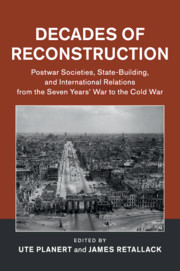
-
Select format
-
- Publisher:
- Cambridge University Press
- Publication date:
- July 2017
- June 2017
- ISBN:
- 9781316694091
- 9781107165748
- 9781316617083
- Dimensions:
- (228 x 152 mm)
- Weight & Pages:
- 0.76kg, 394 Pages
- Dimensions:
- (229 x 152 mm)
- Weight & Pages:
- 0.55kg, 394 Pages
You may already have access via personal or institutional login
Book description
As wars and other conflicts increase on a worldwide scale, the alleged 'new wars' of the present day have taught that military victory does not necessarily result in a sustained state of peace. Rather, societies in conflict experience a 'status mixtus' - a transformative period that includes substantial changes in economy, politics, society and culture. Focusing on these decades of reconstruction in Europe and North America, this book examines the transformation of state systems, international relations, and normative principles in international comparison. By putting the postwar decade after 1945 into a long-term historical perspective, the chapters illuminate new patterns of transition between war and peace from the eighteenth to the twentieth century. Experts in the field show that states and societies are never restituted from a 'zero hour'. They also demonstrate that foreign and domestic policy are intermixed before and after peace breaks out.
Contents
Metrics
Altmetric attention score
Full text views
Full text views help Loading metrics...
Loading metrics...
* Views captured on Cambridge Core between #date#. This data will be updated every 24 hours.
Usage data cannot currently be displayed.
Accessibility standard: Unknown
Why this information is here
This section outlines the accessibility features of this content - including support for screen readers, full keyboard navigation and high-contrast display options. This may not be relevant for you.
Accessibility Information
Accessibility compliance for the PDF of this book is currently unknown and may be updated in the future.


